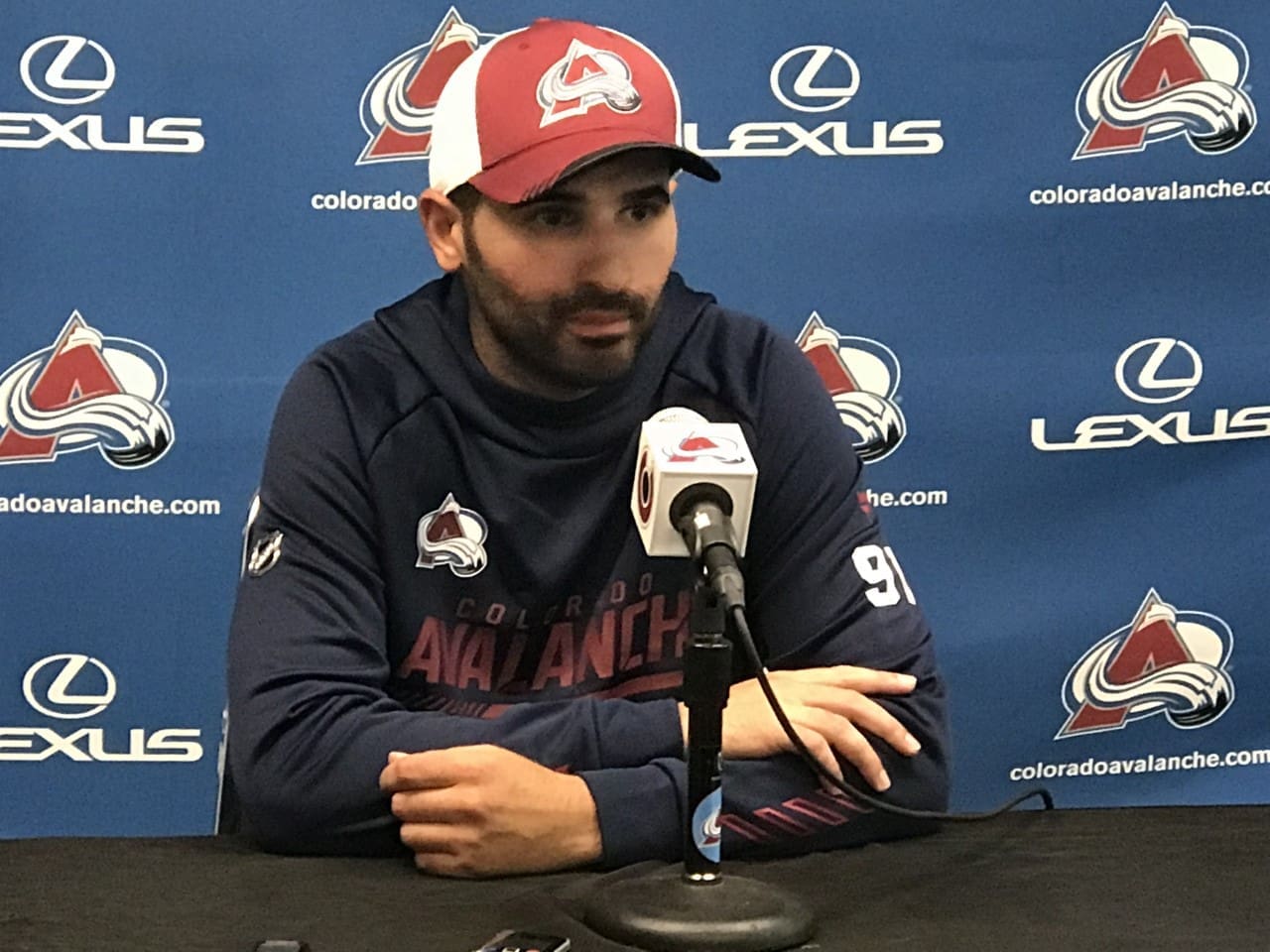Avs Training Camp
Frei column: Nazem Kadri wants to “move on” from costly hit

This is a given: In pro sports — not just hockey — players’ reputations come into play when determining what’s clean or dirty; or legal or illegal; or worthy of a suspension rather than a slap on the wrist and a scolding imploration to never do it again.
It can even be the young offensive tackle drawing a flood of holding calls mainly because he’s developed the reputation as a serial offender. He’s called for holding because he’s known to hold. (See the early career incarnation of Denver Broncos tackle Garett Bolles, who’s now shaken the reputuation, is an all-pro and could wrestle pass rushers to the turf every play while rarely — or never — drawing flags.
There are many more examples of the phenomenon in sports, in all the leagues. Some of them are where degree of stardom is the standard, such as when LeBron James goes to the floor and looks more like a writhing Real Madrid soccer player than basketball’s best. But he draws the foul. Similar bad acting from a backup small forward draws orders to get up and play on.
But we’re talking hockey here, so this is about the Curious Case of Nazem Kadri, the Colorado Avalanche center who drew a painfully costly eight-game suspension for his hit on the Blues’ Justin Faulk in Game 2 of the first round of the NHL playoffs last spring.
The loss of Kadri for the remainder of the Avalanche’s stay in the 2021 postseason substantially diminished an otherwise “soft” team’s chances of winning the Stanley Cup for the third time in the franchise’s 26 years in Denver. His reputation as a hothead who will be part of a perfect storm — undisciplined play at the worst possible time — was well-established from his tenure with the Maple Leafs.
But that needed to be, was supposed to be, behind him when he came to the talented Avalanche. He had 131 penalty minutes in 107 regular-season games with Colorado. Choir boy? Of course not. But the Avalanche needed Kadri’s trend-setting sharp edge and grit, but was without it for the remainder of the sweep of the Blues, then the ugly second-round collapse against Vegas.
Over the summer, Colorado Hockey Now‘s Adrian Dater spoke with Kadri and got his side of the story, going over details of the hit that don’t need to be repeated again. That’s here.
What’s pertinent now is that Kadri is back among his Avalanche teammates in camp. He’s working to convince them that he’s worthy of their trust and won’t go into brainlock mode and hurt his team when it needs him to be productive and energizing, especially in the different game that is playoff hockey.
Amid that atmosphere, he met with members of the Colorado media after Monday’s camp session. In the previous few days, select teammates reaffirmed their faith and trust in Kadri – and sounded sincere.
For his part, he said he bought into all that, too.
‘Not one bit,” he said of that loss of trust. “Not one bit. They understand who I am as a person, what kind of character I have. I’d love to think that I hsve everyone’s trust in the locker room. ai’m sure they’d all say the same thing. They understand I’m a competitive guy, I do what I’ve got to do. I’m going to play hard, I’m going to show up every night.”
Yes, at the outset of this collumn I alluded to “reputation” calls and rulings in sports, and I’m betting you inferred this was going to be hometown argument that Kadri was the victim of ovrreaction.
If you thought that, you were right … but only to a point.
In a system that penalizes repeat offenders, that’s part of the scales of justice. This was Kadri’s sixth suspension, his third in the playoffs. It’s a fine line, but I also believe that while Kadri’s hit was a reckless and inexcusable, it was a split-second decision … or not a decision at all in a game of reaction.
He should have been suspended.
He should have been chided for letting his team down.
HIs past transgressions as part of progressive discipline absoutely should have come into play.
But if you think just about anyone else would have drawn an eight-game playoff suspension for the same hit on Faulk, you’re naive.
Especially the NHL’s refusal to take his appeal — which, if successful, could have led to a shortening of the suspension — was perplexing. Gary Bettman and independent arbitrator Shyam Das refused the appeals in separate rulings.
I asked him about the appeal process.
“It’s all definitely strenuous for sure,”he said. “Just time-consuming. We didn’t have a whole lot of time to work with, so we kept pressing for a response, for an answer. In the end, I think it’s if you can’t come to a conclusive answer, the decision’s going to stand. That’s where we were at with that. I strongly disagreed, but what are you going to do?”
I next asked Kadri if he had thought those overcoming-his-reputation days were behind him.
“I’m kind of used to that situatioin by now,” he said. “There’s some consequences that go with playing hard and playing feisty. Obviously, I’m a skilled player as well. So I’m not just looking to go out there just play a physical style of game. I enjoy scoring, I enjoy playing on the power play, so for me all that stuff is really white noise. I try not to concentrate so much on it and just worry how I can help this team. I know I can for sure.”
Terry Frei is a Denver-based author and journalist. He has been named a state’s sports writer of the year seven times in peer voting — four times in Colorado and three times in Oregon. His seven books include the novels “Olympic Affair” and “The Witch’s Season.” Among his non-fiction works are “Horns, Hogs, and Nixon Coming,” “Third Down and a War to Go” and “’77: Denver, the Broncos, and a Coming of Age” and “March 1939: Before the Madness.” He also collaborated with Adrian Dater on “Save By Roy,” was a long-time vice president of the Professional Hockey Writers Association and has covered the hockey Rockies, Avalanche and the NHL at-large. His web site is www.terryfrei.com and his bio is available at www.terryfrei.com/bio.html












